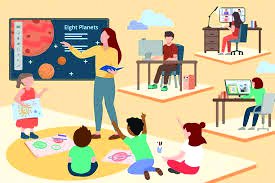


“Changes are an inevitable part of life”. In line with this, the National Education Policy (NEP) of India 2020, approved by the Union Cabinet, brings a number of changes to the educational system. It aims to transform the educational landscape in India to prepare students for the challenges of the 21st century. Especially when it comes to children with disabilities, the policy emphasises the need for inclusive education and accessibility in schools to help them learn and grow.
However, since traditional times, children with disabilities have been sent to “special schools” and kept out of the mainstream educational system. They have also often been taken away from their family and put in long-term residential schools where they receive an education away from the community. This is where accessibility in the educational field emerged as a significant aspect. Accessibility, particularly in playschool, ensures that all the children, including those with special needs, can fully participate in all the learning activities. So, let’s delve into its significance and why playschool needs it.
Accessibility: Need of the Hour
Giving all kids equal access and opportunities, irrespective of any physical, sensory, cognitive, or other impairments, is the essence of accessibility in education. A neurotypical child’s curiosity, inventiveness, and problem-solving abilities can be encouraged in an accessible setting. At this point, creating an inclusive environment where every child feels valued and accepted is crucial. In fact, making preschool accessible to special needs kids will foster in other youngsters a sense of empathy and deference. Furthermore, children with special needs benefit greatly from socialising with peers who are typically growing up in an inclusive setting. It encourages social interaction and aids in dispelling myths. As a result, when all children can fully participate in activities, the overall learning outcomes improve.
How to embrace accessibility and have fun while learning
Understand the need: While India is home to over 1.4 billion residents, over 2.2% of this population endures some form of severe mental or physical disability, including children, as per Statista. Thus, in order to implement accessibility play, schools must ensure that all classrooms and other facilities are built with ramps, wide doors, elevators, restrooms, and seating that is appropriate for all users. Furthermore, open communication is also the key to understanding the specific needs of each child with a disability. By creating an inclusive environment, playschools can ensure that all children have equal opportunities to learn and thrive.
Regular training: To guarantee that all students, regardless of ability, have an equal opportunity to learn and participate in activities, regular training sessions on inclusive practices and accommodations for teachers and staff can be helpful. By presenting the same information in a variety of ways, educators stand a better chance of sparking intellectual interest, making learning more engaging and enjoyable for students.
Flexible curriculum: Providing accessibility tools like text-to-speech, screen readers, and alternative text for images allows students to customise their learning experience. This fosters inclusivity and allows all children to fully engage in learning activities. Thus, schools should design flexible curricula that can be adapted to meet the needs of children with diverse abilities. For instance, schools are creating themed play areas where children can explore and learn through imaginative activities related to numbers, letters, or nature.
Accessible education: Paving the way for the future!
Without a doubt, ensuring accessibility at play schools is critical to allowing all children to participate in and benefit from the learning experience. Thus, prioritising accessibility in early childhood education for special needs children promotes inclusive learning settings. In addition, children with special needs can benefit from specialised support, adaptive technologies, and inclusive classrooms when parents, educators, and others work together to ensure their academic and social success.
The author is the Founder and CEO.